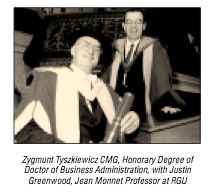Justin Greenwood
Justin Greenwood is Professor of European Public Policy at Robert Gordon University in Aberdeen, and a visiting Professor at the College of Europe.[1]

Contents
Links with EU corporate lobbyists
Greenwood has strong person and financial ties to corporate lobbyists active in the EU.
For example he appears close to Zygmunt Tyszkiewicz formerly the head of the federation of Employers federations UNICE (now Business Europe. In 2000 Tyszkiewicz was awarded an honorary degress at Robert gordon University receiving it ast a cermony at which Greenwood posed for photographs with the Polish lobbyist. According to the newsletter RGYou:
- Count Zygmunt Tyszkiewicz... was born in Warsaw and naturalised British in 1955, served as an officer in the XII Royal Lancers before embarking on a highly successful career with Shell. He began by handling Shell's affairs in the French-speaking African region, and went on to become General manager of Shell and BP Tanzania. From 1979, he was managing director of Shell companies in Greece, where he became involved in the politics of business, twice being elected President of the Greek Oil Industry. Then in 1985 he took up the post of General-Secretary of UNICE, a post he occupied for 12 years. While Secretary General, Mr Tyszkiewicz created cohesion among great diversity of UNICE members and made the organisation heard, understood and often supported by European Union institutions.[2]
According to Corporate Europe Observatory[3]:
- Many academics are more than happy to take consultancy/research money from corporate interests. Greenwood has, for instance, undertaken consultancy work for the pharmaceutical industry.[4] In his February 2002 CV posted on the internet he acknowledges: 'Over £200,000 (approximately €300,000) in income attracted over last five years, from outlets including the European Commission, British Academy, Carnegie Foundation, Ernst & Young, Cargill, Pioneer Overseas Corporation, and EU and domestic trade associations including the EU Committee of the American Chamber of Commerce.'[5] In summer 2001 Greenwood interviewed a number of "senior EU policy makers" on behalf of 'a cross-sectoral business association under confidentiality conditions.' As the only cross-sectoral association listed, presumably this is AmCham EU. The rest of the money - around £160,000 (approximately €240,000) (minus the uncharacteristically unpublicised money from AmCham) funded the research for Inside the EU Business Associations.[6]
- All of this schmoozing, conferencing, book writing, sponsorship, research funding, consultancy and academic honours are typical of the myriad connections between corporate-friendly academics and corporate interests. It reaches another level with the contribution to Greenwood's research programme by Cargill and Pioneer Overseas Corporation, both much criticised agri-business corporations with huge biotechnology interests. Another link between these companies and Greenwood is the European Centre for Public Affairs (ECPA), a corporate-friendly seminar and lobbying training organisation with close links to the European Commission. Both Cargill and Pioneer are corporate members of ECPA, while Greenwood sits on the ECPA board, together with Ruth Rawling, Vice President Public Affairs for Cargill and Tim Stocker, European Director of Government Affairs for Pioneer.[7] ECPA was one of the sponsors of the conference that Greenwood organised in September 2000.
Opposition to lobbying transparency
In a written response to an invitation by the Standards Committee of the Scottish Parliament to comment on the statutory registration of commercial lobbyists Professor Justin Greenwood stated on 16 July 2001:
- The requirements of paragraph 21 will certainly keep a number of administrators employed at public expense, but will the public interest be served by this purpose? 'Public Choice' theory suggests that administrators seek to expand their activities in search of careers, status, control and jobs, and in doing so may contravene the interests of the taxpayer and citizen, and restrict the autonomy of other professionals. In short, the public choice tradition suggests there is a tendancy for administrators to find things to do which impose burdens on others and which are not always in the wider public interest, or the stakeholders of the domains in which they operate.
- In sum, the proposals seem unduly directed at one type of lobbyist for reasons that are unstated, and as such raise their own injustices. They appear to serve no public interest goal and may even damage it.[8]
Resources, Publications, Contact, Notes
- Corporate Europe Observer Academia: a partner for advancing the corporate agenda? Corporate Europe Observer Issue 12, August 2002.
- Justin Greenwood, Statutory Registration of Commercial Lobbyists, Evidence submitted to the lobbying consultation of the Standards Committee of the Scottish Parliament, 16 July 2001, Received by the Scottish Parliament 26 July 2001.
Resources
Publications
Contact
Notes
- ↑ Robert Gordon University Professor Justin Greenwood, Aberdeen Business School, accessed 19 September 2011
- ↑ RGYou, Graduation December 2000 The Internal Newsletter of the Robert Gordon University, Volume 4, Issue 1, January / February 2001.
- ↑ Corporate Europe Observer Academia: a partner for advancing the corporate agenda? Corporate Europe Observer Issue 12, August 2002.
- ↑ 'Dr Greenwood is a lecturer at Teesside Polytechnic... who acts as a consultant on drug marketing to pharmaceutical companies.' 'Publications Review: Are drug companies utilising potential of sales representatives?', Pharmaceutical Business News, April 12, 1991.
- ↑ These details are taken from Greenwood's CV posted on the Internet in 2002. The link is no longer live though the page from which it was linked can be seen here: http://web.archive.org/web/20020808201306/http://www.rgu.ac.uk/spal/staff/page.cfm?pge=2690
- ↑ Robert Gordon University 'Professor wins European funding', RGU News Article, Date Posted: 20-Sep-1999.
- ↑ Corporate members of ECPA include large US and European TNCs for whom the €7750 corporate membership fee is insignificant: Anglo American, Kellogg's, BT, Kodak, Cargill Europe, Levi Strauss Europe, Diageo Plc, Masterfoods, Ericsson, Philip Morris International, Ford of Europe, Pioneer Overseas Group, GlaxoSmithKline, Procter & Gamble, Grant Thornton, SAS, Honeywell, United Utilities Plc, Xerox UK Ltd. Source: ECPA website 2002 (page no longer accessible. The closest page held on the Internet Archive is from 9 December 2003: ECPA Corporate Membership, accessed 20 September 2011.
- ↑ Prof. Justin Greenwood, Statutory Registration of Commercial Lobbyists, 16 July 2001.